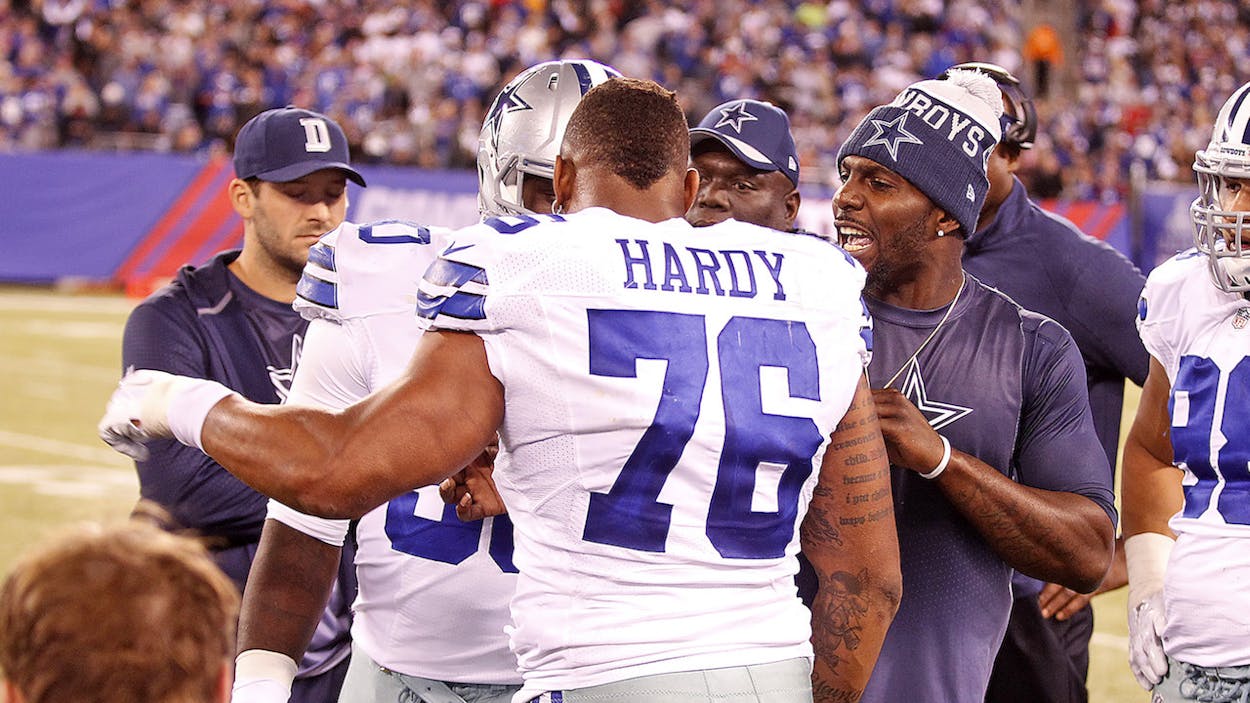People who follow football players’ lives off of the field have had a lot to say about Greg Hardy. I’ve had a lot to say about Greg Hardy since he became a Dallas Cowboy at the start of the 2015 season. Hardy was only available to the Cowboys because the Carolina Panthers decided not to re-sign him after he was convicted at a bench trial of assault and false imprisonment against a woman. (His conviction was later vacated after the woman in question didn’t appear in court during Hardy’s jury trial.) As examples of the ongoing problem that the NFL has with abuse go, Hardy is particularly unsympathetic. He’s been unrepentant in statements, ugly in the way he talks about other women, and unprofessional in his occupation as a member of the Dallas Cowboys. As a result, even Jerry Jones—who stood by Hardy throughout the 2015 season—opted not to offer him a 2016 contract.
Hardy remains a free agent, unable to generate interest even from teams starved for a pass-rusher. That, perhaps, is what led him to sit down with ESPN’s Adam Schefter for a one-on-one interview that was released on Tuesday. Schefter explained his personal takeaways from the interview later that day on NBC Sports personality Dan Patrick’s radio show (note: not the Dan Patrick who is Lieutenant Governor of Texas):
SCHEFTER: I went in with the idea that this guy is a monster. I came out of there with a very different feeling. I came out of there feeling this is a guy who has managed to say the wrong things at the wrong time. Has not always made the right decisions, but I found him to be a changed kind of guy, a guy that, I think realized he did make some mistakes, could have handled things differently. In regards to that incident, I’d like to talk to more people before I made a judgment. All I can go by is what he said. I’ll say this: he wasn’t wavering. He was adamant: ‘I. Never. Touched. This. Woman.’
That seems to be jumping to a lot of conclusions on Schefter’s part. Hardy doesn’t need to be a monster to be guilty of the crime he was accused of. Domestic violence is common—one in three women and one in four men will experience it in their lifetime—and there aren’t that many apparent monsters walking the streets. Mostly there are just people who, like Greg Hardy, can sit down with people like Schefter and say things like domestic violence is “nonexistent in Southern homes,” or claim that the photos showing his victim’s bruises after the incident “can be made to look like whatever they want to.”
But the fact that Schefter didn’t find a monster is almost beside the point—there is no way he was ever going to see a monster in his sit down with Greg Hardy. Hardy likely had a publicist-hatched game plan ready to go for the interview. He had plenty of time to figure out what he had to say, and how he was going to deny the accusations against him. To believe that he’s “a changed kind of guy” because he didn’t seem violent to you is like believing that someone at the fair with tarot cards can actually see your future: the whole job is to make you believe it. Surely, sitting across from Schefter in the studio, Greg Hardy also didn’t look like somebody who might drag a 320-pound offensive tackle around like a stuffed animal before slamming his helmet into the head of an opposing quarterback and throwing his limp body shoulder-first into the turf, but we know for sure that he’s done that.
Sports journalism has a history of buying into chintzy—sometimes downright obscene—myth making. That’s harmful when it comes to providing totally unearned fuel for the engine of redemption narratives that sports fans, and sports reporters, love. The stakes aren’t low when you use a platform like ESPN to A) let Greg Hardy declare himself innocent no matter what your lying eyes might tell you and B) try to apply a script like “he’s a changed man” to somebody like Hardy just because he didn’t show an ugly side in a brief interview.
Greg Hardy’s not a Cowboy anymore. He might not even be a football player anymore, though if he ends up in an NFL uniform in time for training camp, he should send Schefter a big ol’ fruit basket.








